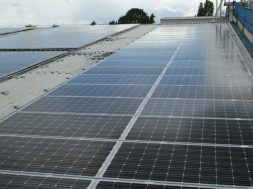
New Delhi-based IREDA has reported total assets of Rs 222 billion at 30 September 2018
Global credit ratings agency has cautioned investors in public sector NBFC India Renewable Energy Development Agency (IREDA) by changing the outlook on outstanding to negative for the “deterioration in IREDA’s financial performance, due to an increase in problem assets, as well as a significant decline in profitability, driven by certain changes in accounting norms.”
Moody’s has an outstanding rating of Baa3 on IREDA’s senior unsecured debt but changed the rating outlook to negative from stable. This comes on the heels of another global ratings agency Fitch which had downgraded long-term senior unsecured issuances from IREDA to ‘BB+’ from ‘BBB-’ due to “lower capital adequacy and elevated risk in the renewable energy sector” in December. The ratings indicate highly speculative junk bond status to the IREDA instruments.
New Delhi-based IREDA has reported total assets of Rs 222 billion at 30 September 2018. It is the nodal agency to route the government’s various subsidies and grants to the renewable energy sector and is the program administrator for the Ministry of New and Renewable Energy schemes, such as the generation-based incentive scheme for wind and solar power projects, a rooftop solar power programme and a capital subsidy scheme for solar water heating systems. In December, IREDA had planned to raise Rs 250 crore through 10-year green bonds but scrapped the proposed sale because of tepid investor interest, Financial Express reported.
Unlisted IREDA’s nonperforming loan ratio rose to 7.4% at 30 September 2018, a significant increase from 6.0% at 31 March 2017 and 3.5% at 31 March 2013, the Moody’s report said. In addition, the company’s profitability declined to 0.8% on an annualized basis in the first half of fiscal 2019 compared with 2.0% in fiscal 2018. In addition to this, last year, the RBI normalized bad loan recognition across the lending spectrum, forcing public sector NBFCs to follow the same 90-day timeline as banks and private NBFCs.
Moody’s pointed out the negative rating outlook reflects its expectation that the company’s Ba3 rating could come under pressure, if the weak financial performance is sustained over the next 12-18 months.
Animesh Damani, Partner, Artha Energy Resources, a renewable energy consultant, told Mint that the nature of financial stress in the sector has become very geography-specific now. “A developer with assets in Rajasthan will get paid on time by the state distribution companies (discoms) maybe with a lag of 2 months, which is acceptable. But for developers in Maharashtra and Tamil Nadu, the payments have not been forthcoming leading to lots of stress for projects in these states. Also, there is no bill discounting facility available for developers, so there is no way to raise cash against receivables. This has been causing considerable stress for renewable energy developers, and in turn, their lenders.
“About 75% of IREDA’s bad loan portfolio has been in biomass, cogeneration and small hydro projects, all of which have failed in India. So IREDA has these long-standing legacy problems. Going forward, even if IREDA wants to increase its solar and wind portfolio, it will have to lend at current tariff levels, which have fallen to all-time lows. It’s a very risky proposition for them,” Damani added.
“The renewable energy space has been impacted by macro level factors over the past 1 year in terms of fund availability, like a transient period of fund crunch due to the NBFC liquidity crisis, volatile equity markets and a low risk appetite of investors stymying IPO plans for few key RE players and rupee depreciation and an increase in hedging costs adding to cost pressures,” said Rahul Prithiani – Director, CRISIL Research. “This has made fund raising a challenge over the past few months with added pressure on bid tariffs. However, the larger players have still been able to raise capital or are finding alternate methods to do the same by tapping international equity/debt markets, global investors providing equity, selling assets etc.”












